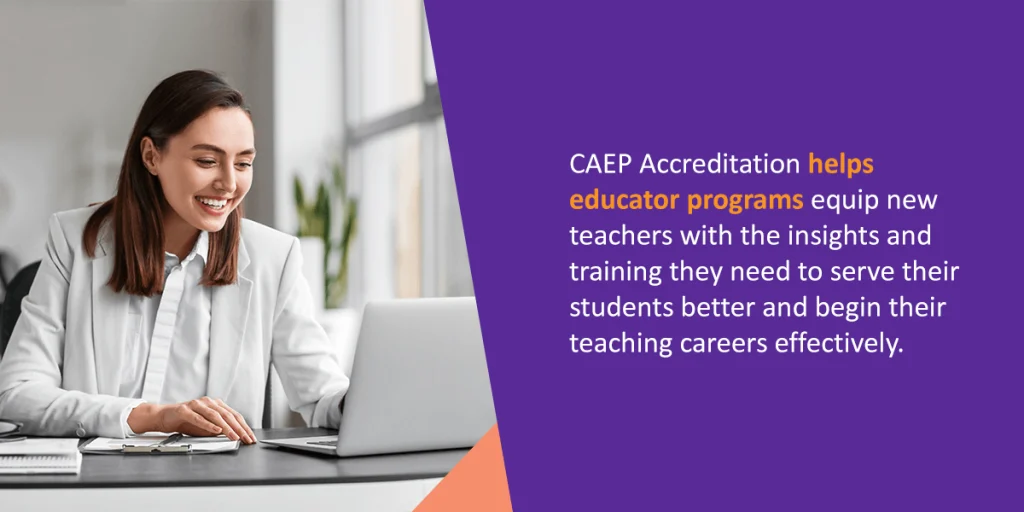




The accreditation process can vary slightly depending on the agency. The Council for Accreditation of Educator Preparation (CAEP) sets the gold standard for teacher ed. Many institutions spend years preparing for their accreditation review, and the process can quickly become overwhelming.
With a greater understanding of CAEP, those embarking on the accreditation process can take steps to improve their chances for approval.
We are delving into some straightforward tips to help your higher education institution prepare for — and conquer — CAEP accreditation.
The Council for Accreditation of Educator Preparation is a national accrediting agency for programs dedicated to teacher preparation. It was officially recognized by the Council for Higher Education Accreditation (CHEA) in 2014.
CAEP’s ultimate mission is to ensure the quality of student learning from preschool through grade 12.
CAEP is the only CHEA-recognized national accreditation for educator preparation. The agency is dedicated to both quality assurance and continuous improvement to elevate grade school learning in the United States.
CAEP Accreditation helps educator programs equip new teachers with the insights and training they need to serve their students better and begin their teaching careers effectively.

The CAEP accreditation process involves the following steps:
Preparation for accreditation begins with the higher education institution familiarizing itself with CAEP’s standards.
The university or college will prepare a self-study report (SSR) that exhibits the way its operations meet CAEP criteria. Creating the report will happen anywhere from nine months to a year before the scheduled site visit.
CAEP personnel will review the institution’s SSR and make a formal visit to its campus. The visit will include the following:
The next step in the accreditation process involves two CAEP review panels.
The initial review panel will follow the site visit and evaluate whether or not the institution met all standards and what areas of improvement exist. If necessary, the panel may make recommendations to the institution for meeting more of the criteria.
After the initial review panel, a joint review panel will take place. The CAEP team will use this as an opportunity to make final recommendations to the accreditation council.
Finally, the CAEP council will meet and decide if the institution is worthy of accreditation.
The council will likely deny extending accreditation if the institution fails to meet any of the CAEP standards.
For universities or colleges that meet or exceed all CAEP standards, the council will likely extend accreditation for a seven-year period.
Explore these tips to help your institution master the CAEP accreditation process:
There are seven standards that must be met to achieve CAEP accreditation, and each has multiple facets. However, they are all designed with a singular purpose: to drive continuous improvement in your educator preparation program.
The standards cover everything from making sure instructor candidates are prepared to teach effectively to tracking the student teaching opportunities you create to measuring your program’s overall impact.
The official list of CAEP standards includes:
For many years, schools focused their efforts on gathering actual physical evidence for their accreditation review visits, but now find it far easier and more effective to manage the CAEP accreditation process using digital tools.
Higher education software helps institutions gain more control over the data they use for decision-making and continuous improvement. Through automation and specialized tools, your institution can stay organized and prove to CAEP that it meets all necessary accreditation standards.
Institutions aiming for CAEP accreditation can benefit from working with a software provider that helps streamline the gathering and analysis of data.
The institution can use the data to find solutions and measure key performance indicators that are critical to decision-making. Working with higher education assessment software allows colleges and universities to efficiently make changes that boost student outcomes while helping them stay up-to-date on the practices that lead to academic success.
If your institution is looking to streamline the accreditation process, turn to Watermark. Our higher education software solutions help support continuous improvement.
From automating tedious tasks to gathering important data, our solutions are here to help your institution evolve. We understand that insights are the driving force behind progress. Our solutions can help your institution meet the standards of accrediting agencies and achieve greater success. We designed our Planning & Self-Study system to centralize strategic planning and simplify the accreditation process.
Are you ready to learn more? Request a demo of the solutions from Watermark today!


























































































































































































































































































































































































Submit this form to schedule a meeting with one of our reps to learn more about our solutions. If you need customer support instead, click here.